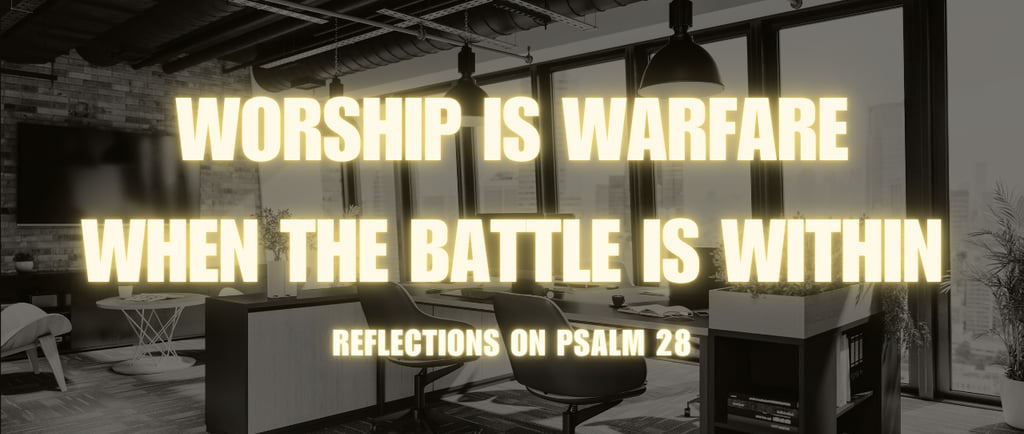Purchase Your WorkBook Today!
Day 218 Worship Is Warfare—When the Battle Is Within
When David shifts to praise in verse 6, it's not because everything has changed—it’s because he has changed. The external war may still rage, but the internal war has been won through trust.
8/6/20252 min read


Worship Is Warfare—When the Battle Is Within
by Torrie Slaughter
📖 “The Lord is my strength and my shield; in him my heart trusts, and I am helped.” – Psalm 28:7a (ESV)
🔍 Reflection:
Worship isn’t always easy. Sometimes, it’s a fight—a resistance against discouragement, distraction, fear, or silence. Psalm 28 takes us into the battlefield of David’s heart, where desperation gives way to divine dependence, and complaint turns into confident praise.
In verse 1, David cries out, “Do not turn a deaf ear to me.” This is no casual prayer. It's a plea from a man who knows what it feels like to face the silence of God—and still believe He's listening. David calls God his Rock, not because the ground beneath him is steady, but because God Himself is stability when everything else is unstable.
In Ezra 3, the altar is rebuilt amidst fear. The foundation of the temple is relaid with praise—but also weeping. Worship happened in the tension of broken memories and hopeful beginnings. And that’s often where we live too—fighting to worship while our emotions are still catching up to the truth we know.
David lifts his hands toward God's holy place in verse 2. It’s a powerful picture of surrender and spiritual alignment. In our culture of striving and self-sufficiency, lifting our hands isn’t just symbolic—it’s defiant. It’s saying: “I won’t worship my worry. I choose to reach for God.”
When David shifts to praise in verse 6, it's not because everything has changed—it’s because he has changed. The external war may still rage, but the internal war has been won through trust.
Ezra’s story reminds us that worship always invites resistance. Ezra 4 introduces opposition almost immediately after the rebuilding begins. But even when enemies surround, and silence looms, the posture of worship is our greatest weapon. Worship builds what fear tries to tear down.
David’s final request in verse 9 is no longer just personal. He prays for the people—God’s inheritance—asking the Lord to carry them like a Shepherd. That’s spiritual maturity: when your cries turn into compassion for others.
💡 Takeaway:
When you’re fighting to worship, remember:
God’s silence is not His absence.
Lifting your hands is an act of spiritual war.
Praise isn’t a result—it’s a weapon.
God doesn’t just answer—you are helped.
True worship overflows into intercession.
So if you’re in the middle of a rebuild—emotionally, spiritually, or relationally—don’t let the resistance stop you. Let it push you deeper into the presence of the One who hears, helps, and holds you.
🙏🏽 Prayer:
Lord, when I feel surrounded, help me lift my hands instead of throwing them up in defeat. You are my Rock, my strength, and my shield. Teach me to worship when it's hard—to praise when I’d rather panic. May my trust in You overflow into prayers for others. Carry me, carry us, and lead us with Your shepherding love. In Jesus' name, Amen.
✨ Next Step:
Take five minutes today to worship through resistance. Whether it’s a whisper, a song, or lifted hands—choose to praise God not because you feel it, but because He’s worthy. Then, text someone and intercede for their strength too.

We Want To Connect With You!
Contact Us
hello@ourgivenpurpose.com
© 2026. All rights reserved.

